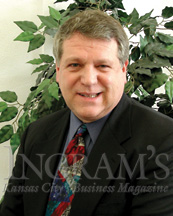small business adviser
by ted knous

Just add water? Not exactly, says R.W. Trewyn, vice provost for research
at Kansas State University. What works for a plant seed will not work
for an entrepreneur who hopes to germinate a good idea into a healthy,
thriving business.
As president of the Kansas State University Research Foundation (KSURF),
Trewyn has worked with numerous entrepreneurs to take ideas from the abstract
into the economy. Trewyn advocates that a research-intensive university
has a responsibility to discover new knowledge and communicate it for
the betterment of society. What better way to communicate those ideas
and discoveries than through commercial product or technological development?
Several great ideas for possible products and services have been launched
through KSURF’s partnership with the Mid-America Commercialization
Corporation (MACC), a business incubator located in Manhattan, Kan.
While a great idea, like a good seed, is a great start for a new business,
it will only go so far without support and nutrients. Luckily, many communities
offer help for the early-stage business in the form of business incubators,
which provide an array of planning, finance, and management services—the
nurture and support. According to the National Business Incubation Association
(NBIA), an entrepreneur can choose from more than 900 incubator programs
in the United States. These are good investments for the communities because
incubators create jobs, diversify economies, commercialize dormant technologies
and create wealth.Incubator clients vary, according to the NBIA. Nearly
10 percent of incubators focus on assisting start-up companies from a
specific industry, such as biomedicine or food protection. One quarter
of incubator clients focus on technology, and 10 percent are in manufacturing.
Clients also vary in what services and products they need from the incubator.
One prime example is MACC, which provides laboratory, office and light
manufacturing facilities and administrative support for new venture businesses,
ones being created by regional entrepreneurs and particularly by university
researchers through a technology transfer partnership with KSU Research
Foundation.Even though this type of business incubation is a proven model,
young businesses must be certain that all the expertise, networks and
tools they need are available to make their ventures successful. They
must look for an incubator that can provide the support needed to move
toward sustainability while they focus on developing technology or product.
The client should be looking for such things as strategic planning, business-plan
development, direct management assistance, recommendations for an effective
and committed board of directors, and providing administrative, financial
and product-to-market capabilities.
An effective incubator should provide other nurturing and supportive services
like marketing help, intellectual property management, assistance with
securing financing, and flexibility in obtaining resources for whatever
the development needs of the client might be. An incubator should also
help a new business integrate into the community and find its fit within
the economic development goals of that community, that is, help transplant
the new business.
The incubator must provide access to quality and appropriate rental space,
with administrative services and equipment, technology support services,
and a management team that can focus and guide the new business. It also
must provide marketing, financing, and product development opportunities
for the new venture to capitalize upon.The goal of any young business
is to "graduate" from its incubator as a freestanding and financially
viable enterprise. Therefore a mutually beneficial relationship must be
established.
Two principles of effective business incubation are needed, according
to the NBIA:
• The incubator must continually focus
on having a positive impact on its community’s economic health by
maximizing the success of the emerging companies; and
• The incubator itself must become a
dynamic model of a sustainable, efficient business operation. Following
these two principles, organizations like KSURF and MACC are dedicated
to germinating and growing new ventures and, upon their "graduation,"
transplanting them into the regional economy.
Ted. R. Knous, Ph.D., is associate vice provost for technology
transfer and research administration. He may be reached by phone at 785.532.6195
or by e-mail at tknous@ksu.edu.